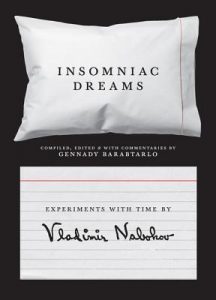John Lanchester in the London Review of Books:
 There’s a joke, attributed to Oscar Wilde, that the most frightening sentence in the English language is: ‘I had a very interesting dream last night.’ If Wilde did say that, it’s a safe bet that he wouldn’t have liked Insomniac Dreams, because this short book is focused entirely on the dream-life of Vladimir Nabokov. It has at its heart a record of dreams that Nabokov kept for eighty days from October 1964, while he was living at the Montreux Palace Hotel – in terms of his books, after he had finished Pale Fire and before he wrote Ada. He recorded the dreams on waking, using the set-up he employed for writing his books, in his neat pencil handwriting, on lined A6 index cards.
There’s a joke, attributed to Oscar Wilde, that the most frightening sentence in the English language is: ‘I had a very interesting dream last night.’ If Wilde did say that, it’s a safe bet that he wouldn’t have liked Insomniac Dreams, because this short book is focused entirely on the dream-life of Vladimir Nabokov. It has at its heart a record of dreams that Nabokov kept for eighty days from October 1964, while he was living at the Montreux Palace Hotel – in terms of his books, after he had finished Pale Fire and before he wrote Ada. He recorded the dreams on waking, using the set-up he employed for writing his books, in his neat pencil handwriting, on lined A6 index cards.
The usual reason people take an interest in their own dreams is to divine their meaning. That wasn’t Nabokov’s motive. The inspiration for his project came from An Experiment with Time, a book by J.W. Dunne, published in 1927 and renowned in its day. Dunne’s theory was that time doesn’t only run forwards in a linear direction, and that, as a result, dreams can contain glimpses of the future. Not that dreams, in Dunne’s view, are only predictive: they mix past events, future events, and random mental fluff. The experiment of recording dreams at the moment of waking was to get evidence for precognition, through a contemporaneous record of dream-predictions which subsequently turn out to be accurate.
More here.
